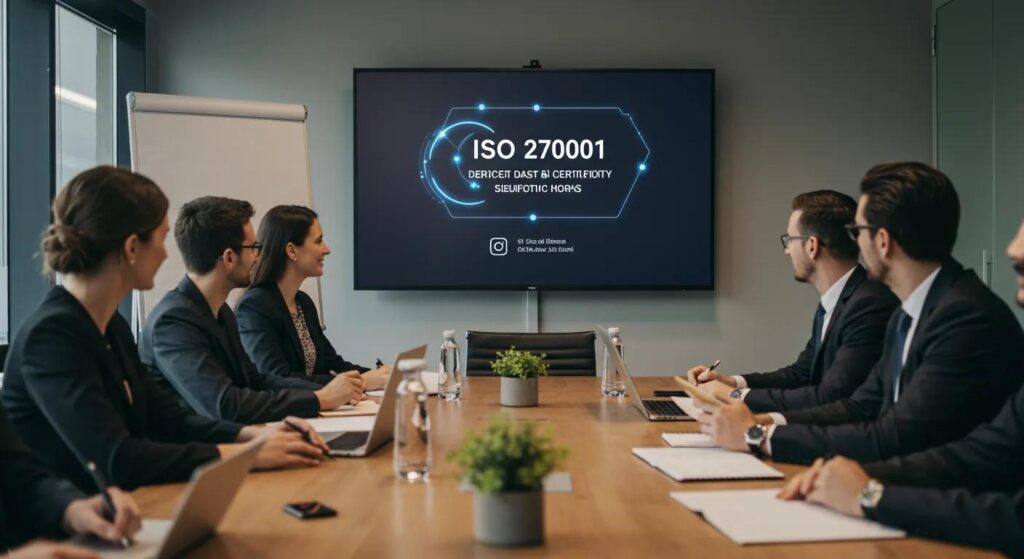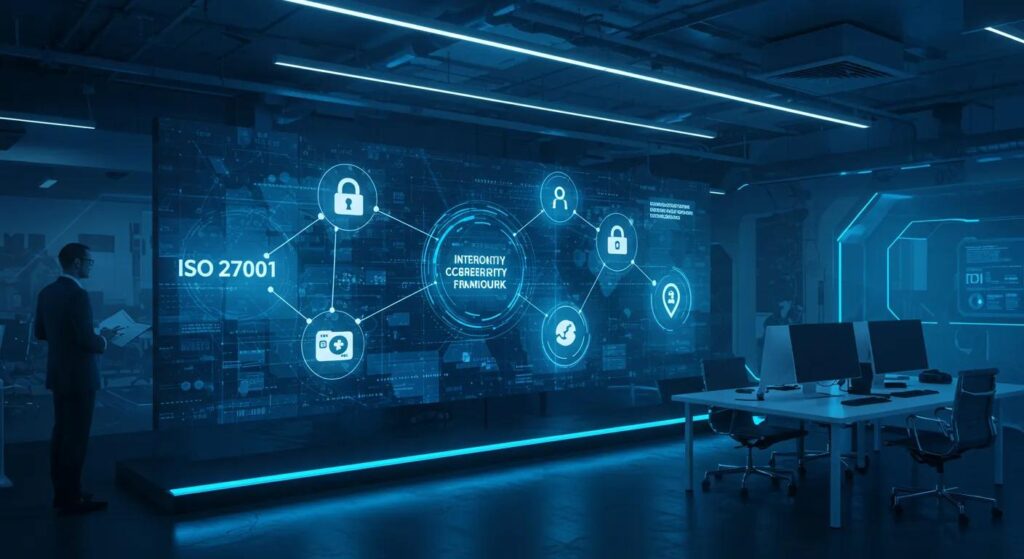ISO 27001 Certification: A Key Shield Against Data Breaches

ISO 27001 Certification: Shield Data From Breaches and Cyber Threats
In today’s digital landscape, businesses face increasing threats of identity theft and cyberattacks. According to recent reports, over 43% of companies experience data breaches annually. Understanding ISO 27001 certification can provide a vital strategy for safeguarding infrastructure against these threats. This article will detail the ISO 27001 standard, its benefits, common challenges, and real-world applications, equipping readers with the knowledge to enhance their endpoint detection and response capabilities. By addressing these aspects, organisations can better manage risks and protect sensitive information from cyber threats.
Key Takeaways
- ISO 27001 certification enhances data security and protects sensitive information from potential breaches
- Achieving certification builds trust and assures clients about the organisation’s commitment to data protection
- A systematic framework for risk management improves resilience against evolving cyber threats
- Continuous improvement and employee training are essential for maintaining compliance and security awareness
- Regular audits and updates strengthen the information security management system and enhance operational integrity
Understanding ISO 27001 Certification Basics

ISO 27001 certification represents a vital framework for businesses aiming to safeguard sensitive data, such as patient information and payment card details. It encompasses essential components, including risk assessments and gap analysis, to enhance data security. Moreover, ISO 27001 certification effectively addresses risks of data breaches and cyber threats through robust authentication and backup protocols. The upcoming sections will outline the key elements of this certification and the steps required to achieve it.
What Is ISO 27001 and Its Importance for Businesses
ISO 27001 is a globally recognised standard developed by the International Organization for Standardization, designed to establish, implement, maintain, and continuously improve an information security management system (ISMS). For businesses, particularly those handling sensitive data—such as in health insurance or critical infrastructure sectors—achieving ISO 27001 certification not only streamlines security protocols but also builds trust with clients and stakeholders. This certification serves as a robust framework, guiding organisations in effectively managing data protection and complying with regulatory requirements, thereby reducing the risks associated with data breaches.
The importance of ISO 27001 certification extends beyond mere compliance; it represents a commitment to security that is documented and verifiable. Companies that adopt this standard can better identify vulnerabilities in their systems, ensuring that protective measures are in place to counteract potential cyber threats. In an ever-changing landscape of information technology, embracing ISO 27001 plays a crucial role in safeguarding information, establishing a secure business environment where data integrity is paramount and client confidentiality is maintained.
Key Components of ISO 27001 Framework
The ISO 27001 framework encompasses several key components that contribute to a robust information security management system. A thorough checklist of requirements assists organisations in identifying their specific needs, while conducting internal audits ensures ongoing compliance with established protocols. Incorporating effective incident response strategies further strengthens an organisation’s ability to manage threats such as phishing attacks, equipping them to react swiftly in case of a data breach.
Another critical aspect of the ISO 27001 framework is the implementation of technical controls, including antivirus software, designed to safeguard against malware and other cyber threats. By continuously assessing and updating these measures, businesses can mitigate risks and protect sensitive data more effectively. This proactive approach not only enhances security but also fosters environmental resilience, ultimately building confidence among clients and stakeholders in the organisation’s commitment to maintaining data integrity.
How ISO 27001 Certification Addresses Data Breach Risks
ISO 27001 certification plays a critical role in addressing data breach risks by establishing a comprehensive framework for information security. By implementing systematic controls and risk management strategies, organisations not only protect sensitive data but also enhance their reputation in the market. The evidence gathered through regular audits and assessments demonstrates a commitment to maintaining high security standards, which can significantly boost client trust and confidence, offering a competitive advantage in today’s digital landscape.
Moreover, the structured approach encouraged by ISO 27001 improves productivity within an organisation. Teams that clearly understand their responsibilities regarding information security can focus on their core tasks without the constant worry of potential cyber threats. By reducing the likelihood of data breaches, companies are better equipped to allocate resources effectively, ensuring that their operational capabilities remain strong while upholding stringent data protection practices.
The Role of ISO 27001 in Mitigating Cyber Threats
ISO 27001 plays a significant role in strengthening endpoint security within organisations, as it emphasises the necessity for regular system updates and applying patches to software vulnerabilities. By implementing an information security management system (ISMS), businesses can ensure that their data protection practices align with both industry standards and regulatory compliance requirements. For instance, adherence to ISO 27001 provides a framework that supports organisations in effectively managing cyber threats posed by malicious actors, critical for sectors such as energy, where adherence to the North American Electric Reliability Corporation (NERC) standards is essential.
Understanding ISO 27001 is pivotal for organisations seeking to bolster their defence against cyber threats. The standard encourages comprehensive policies for incident response, ensuring that teams are prepared to address potential security breaches promptly. By streamlining processes around access control and maintaining robust auditing protocols, companies can mitigate the risks associated with data breaches, thus fostering a culture of compliance and security throughout the organisation.
| Key Component | Description | Benefits |
|---|---|---|
| Endpoint Security | Protection of devices connected to networks | Reduces risk of malware and unauthorised access |
| Patch Management | Regular updates to software to fix vulnerabilities | Strengthens defence against cyber threats |
| Regulatory Compliance | Adhering to laws and guidelines | Ensures operational integrity and builds trust |
| Incident Response Planning | Preparedness for potential security incidents | Minimises damage and ensures rapid recovery |
Steps to Achieve ISO 27001 Certification
Achieving ISO 27001 certification involves several critical steps that organisations must follow to ensure robust information security. Initially, businesses should conduct a gap analysis to identify areas that require improvement concerning their current data protection practices, specifically focusing on aspects like data erasure and intellectual property security. This analysis helps in formulating a detailed plan that addresses potential risks including data loss and vulnerabilities to social engineering attacks.
Next, organisations must implement a comprehensive training programme aimed at educating employees about security protocols and policies. This training should cover best practices related to data handling and breach prevention, enabling staff to recognise and respond to threats effectively. Additionally, organisations can establish a continuous improvement cycle by regularly reviewing and updating their information security management system, ensuring they remain vigilant against emerging risks in the digital landscape:
- Conduct a gap analysis to identify weaknesses.
- Focus on key areas such as data erasure and intellectual property.
- Develop a training programme for all employees.
- Implement security protocols against data loss and social engineering.
- Regularly review and update the information security management system.
With a solid grasp of ISO 27001 certification, one can see its true impact. It brings benefits that extend far beyond mere compliance, leading to a stronger business foundation.
The Benefits of ISO 27001 Certification for Your Business

The ISO 27001 certification provides a strategic approach to enhancing data security, protecting sensitive information against ransomware and other cyber threats. It aids in improving regulatory compliance, including adherence to the Health Insurance Portability and Accountability Act (HIPAA), while also building trust with stakeholders and customers. This policy aligns organisational processes with best practices, equipping businesses with the knowledge needed to maintain a secure operating environment.
Enhancing Data Security Through Certification
ISO 27001 certification significantly enhances data security by promoting structured awareness training among employees, which is essential for recognising threats such as phishing and theft. This training ensures that all staff understand their roles in protecting sensitive information, reducing the likelihood of human error that can lead to data breaches. Additionally, businesses that collaborate with external auditors gain an objective perspective on their security measures, allowing for improvements in their supply chain security and overall data protection strategies.
Furthermore, the framework of ISO 27001 helps organisations develop and implement robust security protocols that align with guidelines from reputable bodies like the American Institute of Certified Public Accountants. By adopting these standards, companies not only bolster their defence against cyber threats but also demonstrate their commitment to maintaining a secure environment for both employees and clients. Overall, achieving ISO 27001 certification equips organisations with essential tools to safeguard their data effectively, enhancing their reputation in the marketplace.
Improving Regulatory Compliance With ISO 27001
ISO 27001 certification significantly enhances an organisation’s ability to achieve regulatory compliance by establishing structured access control measures and risk management strategies. This framework not only safeguards critical assets, such as protected health information, but also ensures that businesses adhere to relevant laws and industry standards. By demonstrating a commitment to data protection, companies can build trust with clients and stakeholders while mitigating legal and financial repercussions linked to non-compliance.
The certification process involves ongoing assessments that reveal potential threats, enabling organisations to proactively implement necessary changes. Regular audits and monitoring of security protocols ensure that all data handling practices meet compliance requirements, thus fostering a culture of accountability and vigilance within the business. Hence, the adoption of ISO 27001 empowers organisations to navigate complex regulatory environments effectively:
- Structured access control measures safeguard sensitive information.
- Proactive risk management identifies and addresses potential threats.
- Ongoing assessments ensure compliance with relevant regulations.
- Regular audits foster a culture of accountability.
- Enhanced reputation with clients and stakeholders.
Gaining Competitive Advantage With ISO 27001
ISO 27001 certification provides businesses with a distinct competitive edge by showcasing their commitment to robust information security practices. This certification not only assists in meeting regulations, such as the General Data Protection Regulation (GDPR), but also elevates a company’s reputation. By conducting regular vulnerability assessments, organisations can proactively identify weaknesses and demonstrate that they are taking the necessary steps to protect sensitive data through effective measures, including encryption.
Furthermore, businesses that achieve ISO 27001 certification align themselves with international standards set forth by entities like the International Electrotechnical Commission. This alignment can reassure clients and stakeholders that the organisation adheres to best practices in information security management. By establishing a comprehensive framework for data protection, these organisations foster trust and loyalty, ultimately serving to differentiate themselves in a crowded market.
Building Trust With Stakeholders and Customers
Achieving ISO 27001 certification fosters trust with stakeholders and customers by demonstrating a firm commitment to maintaining high standards of information security. Companies that incorporate a systematic approach to risk assessment, along with adherence to industry standards such as those set by ISACA, build confidence among clients. This commitment is particularly crucial in sectors, like the payment card industry, where data protection is paramount against cybercrime.
Furthermore, transparency in security practices creates a competitive edge, enhancing customer loyalty. When businesses implement standardization protocols as part of their certification process, they signal to clients that they prioritise security measures. This proactive stance not only mitigates risks but also assures stakeholders that their sensitive information is safeguarded, reinforcing the organisation’s reputation in the marketplace:
- Demonstrating commitment to information security.
- Enhancing confidence among stakeholders and customers.
- Implementing risk assessment strategies for robust data protection.
- Fostering loyalty through transparency in security practices.
Aligning Business Processes With Best Practices
Aligning business processes with best practices through ISO 27001 certification enhances overall operational efficiency, leading to improved return on investment and revenue generation. By standardising procedures related to information security, organisations reduce operational risks and enhance workforce productivity. This structured approach, combined with security awareness training, empowers employees to recognise and respond to potential threats, fostering a culture of accountability and confidence.
Furthermore, adopting ISO 27001 not only strengthens compliance with relevant laws but also positions organisations as leaders in their industry, signalling their commitment to data protection. By demonstrating a proactive stance towards security measures, businesses can build lasting relationships with clients, thus ensuring long-term success. Overall, adhering to best practices helps maintain high standards across all organisational levels, driving both trust and profitability:
- Improves return on investment.
- Enhances revenue through standardised procedures.
- Empowers employees with security awareness training.
- Ensures compliance with relevant laws.
- Builds client confidence and trust.
Achieving ISO 27001 certification can bring many rewards to a business. Yet, the journey to certification is often fraught with challenges that must be overcome to secure those benefits.
Common Challenges in Achieving ISO 27001 Certification

Understanding the ISO 27001 certification process involves identifying areas needing improvement, effective resource management, and robust project planning. Securing leadership and stakeholder engagement is crucial to navigating these challenges. Additionally, organisations must focus on automation and continuous improvement post-certification to enhance data security and mitigate potential cyberattacks. Each of these aspects plays a pivotal role in successfully obtaining and maintaining certification.
Understanding the Certification Process
Understanding the certification process for ISO 27001 requires organisations to navigate several critical steps that encompass thorough audits and the implementation of cyber essentials. The initial phase often involves conducting an internal review to assess current practices against the stringent requirements of ISO 27001. This assessment helps identify gaps in integrity and security measures, allowing organisations to establish a comprehensive action plan tailored to their specific needs, especially in industries governed by stringent regulations such as the Payment Card Industry Data Security Standard (PCI DSS).
In following stages, organisations must engage in a rigorous audit process, ensuring that all security protocols and policies are effectively aligned with the ISO 27001 framework. This continual assessment not only verifies compliance but also reinforces the commitment to data protection within the organisation. By embracing this structured approach, businesses can lay a solid foundation for implementing effective information security management systems that respond to evolving cyber threats, thereby enhancing their overall resilience against data breaches.
Identifying Areas Needing Improvement
Identifying areas needing improvement is crucial for organisations pursuing ISO 27001 certification. A thorough assessment of existing computer security measures allows businesses to pinpoint vulnerabilities that could jeopardise the confidentiality of customer data. For instance, by analysing current practices against the California Consumer Privacy Act, organisations can enhance their protocols, ultimately better protecting sensitive information and reducing legal liability.
This process involves a detailed review of internal systems and procedures to highlight specific weaknesses. By focusing on areas such as access controls and incident response plans, organisations can create a robust framework for compliance and security. Recognising these gaps equips them to implement targeted strategies that not only meet regulatory requirements but also reinforce their commitment to safeguarding customer information:
- Conduct a detailed assessment of existing computer security measures.
- Identify vulnerabilities that could affect customerconfidentiality.
- Align policies with compliance regulations like the California Consumer Privacy Act.
- Implement strategies to reduce legal liability and enhance data protection.
Managing Resources and Project Planning
Managing resources and project planning represents a significant challenge for organisations seeking ISO 27001 certification. Proper allocation of financial, human, and technical resources is essential to implement an effective information security management system. To achieve this, companies must prioritise training staff on emerging threats such as malware, ensuring that all team members understand their roles in safeguarding consumer privacy and mitigating vulnerabilities within the organisation.
Additionally, successful project planning requires the establishment of clear timelines and milestones to track progress toward certification. Organisations are encouraged to gather and analyse statistics relating to previous data breaches to inform their strategies. This data-driven approach not only highlights areas needing improvement but also reinforces the importance of a proactive stance on information security management, ultimately leading to more robust protection against potential cyber threats.
- Proper allocation of financial and technical resources is crucial.
- Prioritising staff training on threats such as malware is essential.
- Establishing clear timelines enhances project planning efforts.
- Data-driven strategies improve understanding of vulnerabilities.
- Continuous improvement leads to enhanced information security management.
Securing Stakeholder Engagement
Securing stakeholder engagement is crucial for organisations pursuing ISO 27001 certification, as it directly impacts the effectiveness of their governance policies. Stakeholders, including team members and leadership, must understand the importance of robust information security measures in protecting the brand‘s reputation. Ensuring that all parties are aligned on the necessity of a well-defined passphrasepolicy and data breach prevention strategies fosters a unified front against potential threats.
Furthermore, involving stakeholders in the certification process encourages a culture of accountability and reinforces their commitment to information security. By actively participating in discussions about risk management and data protection practices, stakeholders can identify gaps in current governance that may expose the organisation to risks. This collaborative approach not only enhances the likelihood of achieving ISO 27001 certification but also strengthens the overall security posture of the organisation.
Continuously Improving Post-Certification
Once organisations achieve ISO 27001 certification, the journey does not end; continuous improvement must remain a priority. Regular evaluations of the information security management system (ISMS) help organisations adapt to emerging challenges in information technology and ensure compliance with evolving privacy laws, particularly those within the European Union. This proactive stance not only strengthens data protection measures but also assures consumers that their sensitive information is consistently safeguarded.
Maintaining ISO 27001 certification involves an ongoing commitment to addressing weaknesses identified through audits and implementing best practices for data protection. Organisations can enhance their security posture by involving employees in training sessions focused on updated compliance measures and threats. This collective effort fosters a culture of security awareness, ensuring that all staff understand their role in protecting consumer information and complying with legal obligations.
- Continuous evaluation of the ISMS is necessary.
- Adoption of best practices is crucial for data protection.
- Employee involvement in ongoing training enhances awareness.
- Adaptation to emerging threats is vital for security.
- Engagement with privacy laws is essential for compliance.
The road to ISO 27001 certification is fraught with obstacles that demand careful planning and strategy. Understanding these challenges can lead to a decisive question: is ISO 27001 certification the right path for your organisation?
Evaluating if ISO 27001 Certification Is Right for Your Business

Evaluating whether ISO 27001 certification suits a business begins with determining its specific cybersecurity needs, assessing capacity for implementation, and considering industry-specific compliance requirements. Analysing the potential return on investment is essential for making informed decisions regarding the cybersecurity strategy, ensuring that the certification aligns with the organisation’s goals and enhances its overall resilience against data breaches and cyber threats.
Determining Your Business's Specific Cybersecurity Needs
Determining a business’s specific cybersecurity needs is essential before pursuing ISO 27001 certification. Organisations should start by assessing the types of sensitive data they handle, such as customer information or financial records, which may be at risk from cyber threats. Understanding the regulatory requirements relevant to their industry will also help businesses identify the security measures necessary to protect their data and comply with applicable laws.
Engaging stakeholders in discussions about current security protocols can reveal gaps that need addressing. For instance, businesses in the healthcare sector may require more stringent measures due to the sensitive nature of patient data. By recognising these unique challenges, companies can tailor their cybersecurity strategies to align with ISO 27001 standards, ensuring they are well-equipped to mitigate risks associated with data breaches and enhance overall data protection.
Assessing Capacity for Implementation
Assessing the capacity for implementation of ISO 27001 certification is essential for businesses considering this significant step toward enhanced information security. Organisations must evaluate their existing resources, including financial support, technical infrastructure, and human capital dedicated to managing an information security management system (ISMS). By understanding their current capabilities and potential gaps, they can create a robust action plan that aligns with ISO 27001 standards, ensuring a smooth transition and effective ongoing management of data protection.
A company’s commitment to achieving ISO 27001 certification requires involvement across all levels of the organisation. This includes securing buy-in from leadership and providing adequate training for employees. Implementing these protocols ensures that everyone is aware of their roles in upholding information security practices. By establishing a culture of security awareness and using comprehensive project planning, businesses can effectively assess their readiness for certification and minimise risks associated with potential data breaches and cyber threats:
| Key Considerations | Description | Actions |
|---|---|---|
| Resource Evaluation | Assess the current financial, technical, and human resources. | Identify gaps and allocate necessary resources for ISMS. |
| Leadership Involvement | Secure commitment from top management for successful implementation. | Encourage involvement in strategy discussions and decision-making. |
| Staff Training | Educate employees about their roles in data protection. | Develop a training program focused on security awareness. |
| Continuous Improvement | Adopt best practices for ongoing compliance and resilience. | Regularly review and update security protocols. |
Considering Industry-Specific Compliance Requirements
When assessing ISO 27001 certification, organisations must consider the specific compliance requirements relevant to their industry. For instance, sectors such as healthcare and finance are governed by stringent regulations that mandate robust data protection measures. By aligning ISO 27001 standards with these industry-specific compliance obligations, businesses can ensure they not only meet legal requirements but also establish a strong framework for safeguarding sensitive information against data breaches.
Furthermore, understanding these compliance requirements can enhance the overall effectiveness of an organisation’s information security management system (ISMS). Companies must evaluate necessary standards, such as the General Data Protection Regulation (GDPR) for European businesses or the Payment Card Industry Data Security Standard (PCI DSS) for those handling payment information. Adhering to both ISO 27001 and relevant regulatory frameworks positions organisations to mitigate risks associated with data breaches while building trust with their clients and stakeholders.
Analysing Potential Return on Investment
Analysing the potential return on investment (ROI) from ISO 27001 certification is crucial for organisations looking to enhance their data security. The investment in achieving this certification is not merely a cost; it ultimately serves as a protective measure against costly data breaches. For instance, companies that implement ISO 27001 standards often find that the reduced risk of security incidents leads to significant savings in potential liabilities and damage control expenses, thus improving overall financial health.
Furthermore, achieving ISO 27001 certification can bolster a company’s reputation, attracting customers and partners who prioritise data security. Enhancing trust among stakeholders can lead to increased business opportunities, ultimately maximising the ROI. By quantifying the benefits of compliance and improved security practices, organisations can present a compelling case for ISO 27001 certification as not only a shield against cyber threats but also as a strategic investment in long-term organisational resilience.
Making Informed Decisions for Your Cybersecurity Strategy
Making informed decisions about a cybersecurity strategy involves assessing the unique risks that a business faces and determining how ISO 27001 certification can mitigate those risks. For organisations handling sensitive information, such as personal data or financial records, this certification offers a structured approach to identifying vulnerabilities and implementing effective security measures. By understanding their specific needs and challenges, companies can better position themselves to enhance their data protection efforts and align with industry best practices.
Furthermore, businesses must evaluate their readiness for implementing the ISO 27001 standards. This includes considering the resources available, such as staff training and technology investments, to support an effective information security management system. A proactive approach to cybersecurity, backed by ISO 27001 certification, allows organisations to not only comply with relevant regulations but also build a strong reputation for securing data, thus fostering greater trust among clients and stakeholders.
Understanding whether ISO 27001 certification suits your business opens the door to practical examples of its impact. Many firms have made significant strides by implementing these standards, showcasing real-world benefits worth exploring.
Real-World Applications of ISO 27001 Certification

The real-world applications of ISO 27001 certification demonstrate its significant impact across various sectors. Case studies highlight how businesses have benefited from adopting this standard, enhancing their data security. Key industries implementing ISO 27001 showcase its versatility, while lessons learned from its implementation provide valuable insights. Furthermore, organisations can measure the impact of certification on their cyber resilience and adopt best practices to maintain ISO 27001 standards effectively.
Case Studies of Businesses That Benefited From ISO 27001
A financial services firm successfully achieved ISO 27001 certification, which significantly improved its data security posture. By implementing structured information security management practices, the company not only protected sensitive customer information but also enhanced its reputation in the market, attracting new clients who prioritise data protection. This commitment to security ultimately led to increased trust from their partners and stakeholders, demonstrating the tangible benefits of adhering to ISO 27001 standards.
In the healthcare sector, a mid-sized health insurance provider saw a remarkable reduction in data breaches following ISO 27001 implementation. The certification process enabled the business to establish comprehensive risk management strategies, which mitigated vulnerabilities tied to patient data. By fostering a culture of security awareness among employees and aligning with industry best practices, the organisation positioned itself as a leader in data protection, thus ensuring compliance with stringent healthcare regulations.
Key Industries Adopting ISO 27001 Certification
Several key industries are increasingly adopting ISO 27001 certification to fortify their data protection practices. The healthcare sector, for instance, recognises the importance of safeguarding sensitive patient information. By implementing ISO 27001 standards, healthcare organisations not only mitigate the risk of data breaches but also comply with stringent regulations governing patientdata security.
Similarly, financial services firms are adopting ISO 27001 certification to enhance their reputation and promote trust among clients. The certification provides a structured framework that helps these businesses identify and manage risks associated with sensitive financial data. This proactive approach allows them to maintain a secure operating environment while meeting regulatory expectations effectively.
- Healthcare sector prioritises patient data protection and compliance.
- Financial services firms enhance reputation and client trust.
- ISO 27001 establishes a structured framework for risk management.
- Adopting the standard fosters a secure operating environment.
Lessons Learned From ISO 27001 Implementation
One significant lesson learned from implementing ISO 27001 is the importance of fostering a culture of security within the organisation. Many businesses discovered that involving all employees in information securityawareness training leads to better recognition of potential threats, significantly reducing the risk of human error. This proactive engagement not only enhances security measures but also empowers staff to take responsibility for protecting sensitive information, effectively addressing their concerns about data breaches.
Another key takeaway is the critical role of continuous improvement in sustaining ISO 27001 certification. Organisations that routinely review and enhance their information security management systems (ISMS) can quickly adapt to emerging threats and regulatory changes. This ongoing commitment ensures that businesses remain resilient against cyber threats, thereby enhancing their reputation and maintaining trust with clients and stakeholders who value robust data protection practices.
Measuring the Impact of Certification on Cyber Resilience
Measuring the impact of ISO 27001 certification on cyber resilience is essential for organisations aiming to protect sensitive data. Certified businesses report a noticeable decrease in the frequency and severity of data breaches, primarily due to the standard’s emphasis on systematic risk management and continuous improvement. For instance, companies often experience enhanced incident response capabilities, which allow for swift mitigation of potential threats, preserving their operational integrity and client trust.
Moreover, organisations that adopt ISO 27001 certification often engage in regular assessments and updates of their information security management systems. This proactive approach keeps them aligned with evolving cyber threats and regulatory requirements, significantly bolstering their resilience against attacks. By integrating such practices, businesses not only safeguard their data but also enhance their reputation in the marketplace, making them more attractive to clients and partners who prioritise security.
Best Practices for Maintaining ISO 27001 Standards
Establishing a routine for internal audits is essential for maintaining ISO 27001 standards. These audits help organisations assess the effectiveness of their information security management system (ISMS) and identify areas requiring improvement. By conducting regular reviews, businesses can ensure compliance with the certification while also adapting to any emerging cyber threats that may pose risks to their data security.
Another important practice involves providing ongoing training and awareness sessions for employees. This approach ensures that all staff members remain informed about the latest security protocols and potential risks associated with data breaches. By reinforcing the importance of data protection through continued education, organisations not only enhance their security posture but also foster a company-wide culture of vigilance in safeguarding sensitive information.
ISO 27001 has defined how businesses protect their information. As threats evolve, its role in the future of cybersecurity becomes even more vital.
The Future of ISO 27001 Certification in Cybersecurity

The future of ISO 27001 certification is shaped by emerging trends in data protection standards and the ongoing evolution of cyber threats. This section will explore how ISO 27001 plays a crucial role in future-proofing organisations against these challenges, particularly through its integration with other cybersecurity frameworks. Additionally, businesses must prepare for changes in compliance requirements to ensure they remain aligned with best practices in data security.
Emerging Trends in Data Protection Standards
As data protection standards evolve, organisations are increasingly recognising the significance of integrating ISO 27001 certification with emerging frameworks like the General Data Protection Regulation (GDPR) and the Health Insurance Portability and Accountability Act (HIPAA). This alignment not only strengthens compliance efforts but also reinforces the overall security posture by establishing a comprehensive approach to data protection. By adhering to these updated standards, businesses can ensure they are well-prepared to address new regulatory challenges and mitigate risks associated with data breaches.
Another trend in data protection standards is the growing emphasis on risk management and incident response capabilities. Organisations are adopting proactive measures that include regular audits, employee training, and risk assessments to ensure they can swiftly respond to cyber threats as they arise. This trend highlights the necessity for continuous improvement and adaptability within the information security management system (ISMS), securing sensitive data more effectively while maintaining customer trust in an environment where cyber threats are increasingly sophisticated.
The Ongoing Evolution of Cyber Threats
The ongoing evolution of cyber threats requires organisations to remain vigilant and adaptive in their information security practices. Cybercriminals are constantly developing new techniques to exploit vulnerabilities, making traditional security measures inadequate. As these threats become more sophisticated, organisations must enhance their cybersecurity frameworks, including aligning with standards like ISO 27001, which provides a structured approach to anticipate and manage potential risks effectively.
Moreover, the rise in remote working has expanded the attack surface, highlighting the need for comprehensive data protection strategies. Businesses face challenges in ensuring secure access to information while dealing with increased phishing attempts and ransomware attacks. To combat these risks, organisations must integrate regular training and incident response planning into their ISO 27001 certification processes, fostering a culture of security awareness among staff to effectively safeguard sensitive data.
- Understanding how cyber threats are evolving.
- Importance of adapting security measures like ISO 27001.
- Addressing vulnerabilities created by remote working.
- Implementing ongoing training and response strategies.
- Establishing a culture of security awareness.
Role of ISO 27001 in Future-Proofing Your Business
ISO 27001 serves as a proactive measure, equipping businesses to anticipate and respond to evolving cyber threats. By integrating this certification into their operational framework, organisations establish a culture of continuous improvement and risk management. This dynamic approach reinforces data protection measures and ensures that companies remain resilient in the face of emerging challenges.
Furthermore, the structured guidelines provided by ISO 27001 enable organizations to stay aligned with regulatory changes and industry best practices. For example, regularly conducting audits and updating information security management systems not only enhances accountability but also mitigates risks associated with potential data breaches. By adopting ISO 27001, businesses not only protect sensitive information but also bolster client trust, creating a competitive advantage in a data-driven economy:
| Key Benefit | Description | Impact on Business |
|---|---|---|
| Proactive Risk Management | Anticipates emerging cyber threats | Enhances resilience |
| Regulatory Compliance | Aligns with industry standards | Builds trust with clients |
| Continuous Improvement | Regular audits and updates | Mitigates risks |
| Cultural Awareness | Promotes a culture of security | Strengthens information protection |
Linking ISO 27001 With Other Cybersecurity Frameworks
Linking ISO 27001 with other cybersecurity frameworks enhances an organisation’s overall security posture by creating a unified approach to data protection. For example, integrating ISO 27001 with the NIST Cybersecurity Framework can provide a comprehensive strategy that encompasses risk management, incident response, and compliance. This combination not only helps organisations meet varying regulatory requirements but also reinforces their commitment to safeguarding sensitive data amidst evolving cyber threats.
This synergistic relationship between ISO 27001 and other standards enables organisations to adopt best practices across different security domains. By aligning these frameworks, businesses can create a robust information security management system (ISMS) that addresses specific threats effectively while ensuring ongoing compliance. Consequently, this holistic approach empowers enterprises to proactively identify vulnerabilities, thereby fortifying their defences against potential data breaches and enhancing trust with stakeholders.
Preparing for Changes in Compliance Requirements
As regulations surrounding data protection evolve, organisations must stay informed about changes in compliance requirements relevant to ISO 27001 certification. This is crucial for businesses aiming to enhance their information security management systems (ISMS) while ensuring adherence to both regional and global standards. Engaging in regular training programmes and maintaining up-to-date knowledge on privacy laws will enable companies to respond proactively to these shifts and preserve their commitment to safeguarding sensitive data.
Preparing for changes in compliance involves implementing a systematic approach to reviewing and updating existing security protocols. Businesses can benefit from conducting regular internal audits to assess their alignment with the latest regulatory frameworks. This ongoing diligence not only strengthens data protection measures but also builds stakeholderconfidence by demonstrating that the organisation prioritises compliance and information security:
- Engage in regular training on evolving data protection regulations.
- Conduct systematic reviews of existing security protocols.
- Implement internal audits to ensure compliance with new requirements.
- Strengthen data protection measures through continuous improvement.
Conclusion
Understanding ISO 27001 certification is essential for organisations seeking to fortify their data security and mitigate the risks of cyber threats. This certification establishes a comprehensive framework, empowering businesses to protect sensitive information while enhancing compliance with regulatory requirements. By adopting ISO 27001 standards, organisations not only build trust with clients but also foster a culture of security awareness among employees. Ultimately, achieving ISO 27001 certification serves as a proactive shield against data breaches, ensuring a resilient approach to information security in an increasingly complex digital landscape.